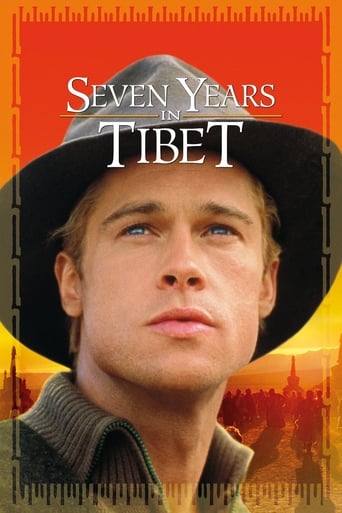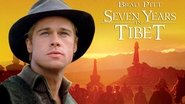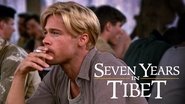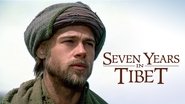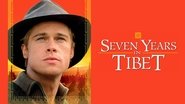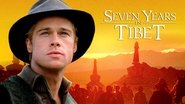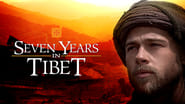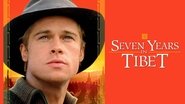sol-
Thrown into a prisoner-of-war camp at the outbreak of World War II, an Austrian mountain climber escapes and eventually finds a new purpose in life as a mentor to the Dalai Lama in this historical drama based on actual events. Brad Pitt has some excellent, quiet moments as the conflicted main character who gradually progresses from arrogant and resentful to humble and compassionate, however, his attempt at an Austrain accent makes it a hard performance to sit through whenever he opens his mouth. There is, however, a lot to like about Pitt's character and the way he comes to see the Dalai Lama (still a boy upon meeting him) as a surrogate son. The friendship and camaraderie between the pair is very sweet and easily the highlight of the film with the Dalai Lama's intelligent questions and Pitt's thoughtful responses. The two do not meet until around halfway in though, and amusing as David Thewlis often is as a fellow POW who escapes with Pitt, the first half the film does not quite have the zest of the second half. This is a technically well accomplished movie either way though with the atmospheric Golden Globe nominated music of John Williams and all the majestic, vast natural landscapes rendering the tale quite immersive. It is hard not to wonder what may have been though with a more compact run-time - and no fake accent.
Python Hyena
Seven Years in Tibet (1997): Dir: Jean-Jacquacs Annaud / Cast: Brad Pitt, David Thewlis, B.D. Wong, Victor Wong, Mako: It seems like it took seven years to view, or perhaps I drifted off to sleep (not difficult under the circumstances) and woke up during the following presentation of the film. Title regards seven years of a man's life and what he turned his back on. Had the director turned his back on this film then perhaps viewers would have been spared the extreme boredom. Set in 1939 Brad Pitt joins an expedition to scale Nanga Parbat. They are taken prisoner by His Majesty's Government in India where Pitt makes several escape attempts with inappropriate comic appeal. One capture takes no more than a quick stabbing then he is off and running again. When in Tibet they compete for a female tailor. Then the Dalai Lama enters the picture etc, etc. Throw in Santa Claus and the Easter Bunny and this film would be complete. Predictable and disjointed with horrible directing by Jean-Jacquacs Annaud. Pitt is miscast and Thewlis is cardboard. Together they turn in one of their worst performances and are joined by veteran actors B.D. Wong, Mako and Victor Wong who also ought to fire their agents after being part of this crap. Theme regards consequence particularly when Pitt is denounced by his son. Viewers should do the same with the film. Score: 3 / 10
tieman64
"It is better to travel well than to arrive." - Buddha Based on a true story, Jean-Jacques Annaud's "Seven Years in Tibet" stars Brad Pitt as Austrian mountaineer Heinrich Harrer. As he lived in Tibet between the years 1944 and 1951, Harrer witnessed China's "invasion" of Tibet. This "invasion" forced the 14th Dalai Lama, Tibet's spiritual leader, to flee into India. "Seven Years" was released in 1997, the same year as Martin Scorsese's "Kundun". Both films present idealised portraits of theocratic, late-feudal Tibet. They romanticise Buddhism, fawn over the Himalayas, and pine nostalgically for Tibetan customs and traditions. In the hands of Annaud and Scorsese, the more radical and so interesting aspects of Buddhism are also ignored. Orientalism (portrayals of the East by the West which generally exhibit cultural bias and/or ignorance) typically represents Eastern cultures as inscrutable and mysterious. The West is offered as a bastion of logic, empiricism and science, whilst Eastern cultures are deemed esoteric, mystical and superstitious. In "Seven Years in Tibet", however, Harrer and the Dalai Lama take turns inhabiting the roles of "student" and "teacher". Elsewhere they ridicule each other's fussy customs and traditions, whilst also displaying a shared interest in science, geography and engineering. This is perhaps not surprising. With no holy writs, no deities, and with its interests in scientific enquiry, Buddhism's always been one of the more science-friendly "religions". Annaud's film climaxes with the Chinese army marching into Tibet and massacring Tibetan soldiers. In reality, this battle did not occur. Before his film closes, Annaud also informs us that over a million Tibetans died at the hands of "evil Chinese communists", a cooked number which most serious academics reject. Scenes like this make "Seven Years in Tibet" a covertly political film, the Dalai Llama presented as a saintly figure unjustly torn from his people and so deserving of political reinstatement. That the Dalai Lama leads only one branch of Tibetan Buddhists, and that the only people calling for his "return" are the unelected Tibetan royals who exploited Tibetans via a repressive military-ruled feudal state, are messy realities ignored by Annaud. That the Lamas speak for themselves and not the Tibetan people (just as every group of privileged exiles has turned to the United States to help them return to power, the Dalai Lama received CIA funding for a number of years), that half of Tibet's population were serfs or slaves before the Chinese arrived (the rest were under the autocratic rule of the Tibetan aristocracy), and that Tibetan peasants sided with Communists and aggressively attacked Tibetan-theocratic institutions, is likewise ignored. Indeed, Tibetan peasants were some of the most radicalised Communists in China precisely because they suffered heavily under their previous rulers. This is not to defend the actions of China – certainly the Lamas were capable of reforming Tibet themselves, certainly every populace deserves to be autonomous if it so wishes, certainly China's migration policies affect how Tibetans now vote on issues of independence – but to highlight the fact that Annaud has presented a sanitised portrait of the region.Most big films "about" Buddhism avoid the "tenets" of Buddhism. In "Seven Years in Tibet", Harrer and the Dalai Lama share a number of cute scenes, but philosophy largely remains off-topic. A better director would fully exploit the possibilities that this material lends – why does a character like the Dalai Llama, who renounces the ego, selfhood and private property care about quaint systems of land ownership and leadership? Didn't exile make the Dalai Llama a wiser man? etc – but again Annaud only cares about the superficial. The film costars Jamyang Wangchuk and David Thewlis. 7.5/10 – See "The Last Emperor", "Spring, Summer, Fall, Winter and Spring" and "Into Great Silence".
Armand
remarkable work. discover a meeting and an universe in gentle and wise way. define a reality. present metamorphose of a life. and, more important, give honest image of facts, without ordinaries ambitions.a film who confirms art of Brad Pitt far from any etiquette. who draws the real Tibet atmosphere out of desire to be a lesson or political answer. who suggest and build grace of colors, sound and silence key for understand a place as part of yourself. sure, it is not perfect. but, like many other exercise , it is a view about things. a profound view, sine ira et studio, but with subtle spirit of joy.this fact is important. and basis of a way to transform existence in precious value. because, it is not a Budist story or a page from a Nazi figure experiences. but only a confession. without rules. without ambition to be revelation. only testimony. and this is its great virtue of this remarkable adaptation.
